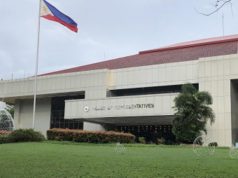Filipinos questioned the lawmakers’ initiative to legislate a bill that proposes to institutionalize an alternative gesture of respect to the traditional handshake used in greetings.
On Tuesday, the House of Representatives approved on third and final reading the House Bill 8149 or the “Bating Filipino Para Sa Kalusugan Act,” which promotes a new way of greeting people in observance of physical distancing protocols during the coronavirus pandemic.
The bill, sponsored by Reps. Bayani Fernando (Marikina, First District) and Roman Romulo (Pasig), introduces a greeting wherein people are enjoined to place their right hand over the center of their chest while simultaneously lowering their head.
The eyes are also either closed or cast down while doing the gesture.
The bill covers all Filipinos and other persons in the country.
Its fact sheet report said the gesture aims to “instill health consciousness through the promotion of a better alternative to the traditional gesture of handshake and thus protect the health and well-being of Filipino people.”
The bill was introduced in line with “the policy of the State to protect the health and promote the well-being of every Filipino.”
“To this end, the State shall set standards of social contact such as a safe and proper gesture to express and convey respect, goodwill, or praise among persons,” the bill reads.
On the other hand, Fernando in his explanatory note to HB 7333 reportedly said that the traditional gesture of shaking hands in greetings is medically risky.
“The medical profession has established that the traditional, well meaning and innocent gesture of handshake transmits communicable diseases and is a risk to one’s health,” he wrote.
“The relevance of this legislative measure becomes more pronounced as we are now suffering from a global health crisis due to the novel coronavirus pandemic,” the lawmaker added.
Fernando further said that he believes the new contactless greeting should be institutionalized as people take a “preventive approach in the spread of communicable diseases, not just COVID-19.”
COVID-19 is a communicable disease that can be spread through respiratory droplets emitted when talking, singing, and shouting. It can also spread through airborne particles containing the virus, especially in enclosed and poorly-ventilated spaces.
Meanwhile, government agencies are mandated to disseminate information and encourage the practice of the new gesture as a way of greeting.
On traditions and institutionalization
Some Filipinos questioned the relevance of this bill and argued that tradition is “not made and formed by laws.”
“You don’t legislate culture,” a Twitter user said in response to the news of House bill passage.
“We cannot impose through legislation the manner of greeting of people as it is inauthentic, forced, and lacks popular participation. In short, the State cannot legislate customs and tradition; it can only recognize, protect, and enshrine them as common patrimony and heritage,” another online user tweeted.
Martin Krygier, in a journal article titled “Law as Tradition” as published in the book “Law and Philosophy,” said that every tradition “is composed of elements drawn from the real or imagined past.”
“This is central to what it means for something to be a tradition. It is not central, or even necessary, to what it means for something to be an act, rule or principle. One can act, lay down a rule, enunciate a principle, and say immediately that that is what one is doing and has done. One cannot openly make a tradition all at once,” he wrote.
“One may originate a tradition, whether one has done so can only be decided after some time, and not on the basis of the originating act alone or even primarily. And while rules can openly be made retrospective (though they are hard acts to follow) traditions cannot,” Krygier added.
He further said that a tradition “is not merely the past made present.”
“It must have been, or be thought to have been, passed down over intervening generations, deliberately or otherwise; not merely unearthed from a past discontinuous with the present,” Krygier wrote.










